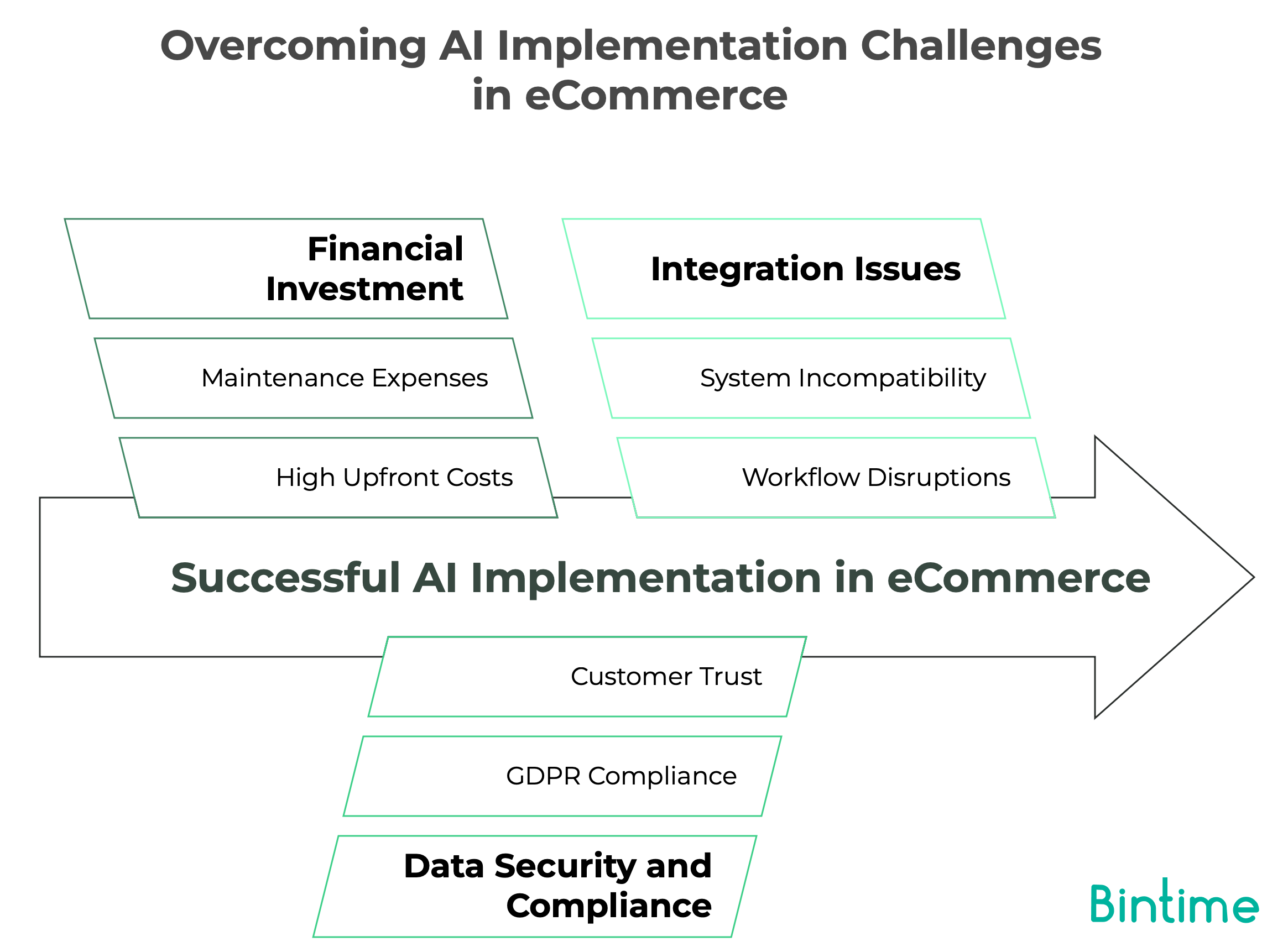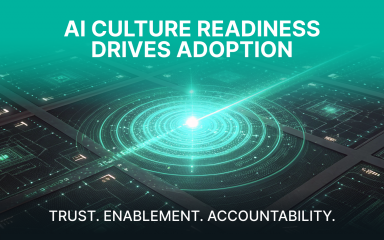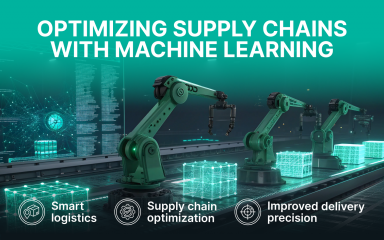Artificial intelligence (AI) and AI algorithms are revolutionizing the eCommerce market, enabling businesses to enhance customer service, optimize operations, and drive higher profits. In today’s increasingly competitive landscape, AI is not just a tool, but a necessity for businesses to stay ahead. AI-powered eCommerce solutions streamline decision-making processes, automate tasks, and provide data-driven insights that make scaling businesses possible. Additionally, AI tools are crucial for optimizing the performance and security of ecommerce websites.
The business value of AI in eCommerce is immense, as AI-enabled tools enhance customer experience and drive revenue growth. Strategic integration of these technologies creates a significant impact on market potential. AI also enhances the online shopping experience by providing personalized interactions and product recommendations.
According to a 2024 MarketsandMarkets report, the global AI market for eCommerce is not just growing, but is expected to skyrocket at a compound annual growth rate (CAGR) of 20.8%, reaching a staggering $16.8 billion by 2028. Companies that integrate AI into their eCommerce strategies can benefit from improved conversion rates, better customer satisfaction, and optimized logistics. This article discusses 15 of the most relevant AI use cases in eCommerce and how they contribute to business operations.
15 Top AI Use Cases in eCommerce
AI-powered Chatbots and Virtual Assistants
AI-driven chatbots and virtual assistants improve customer service by providing instant responses to inquiries, handling multiple requests simultaneously, and offering 24/7 support. AI-based eCommerce platforms integrate conversational AI to boost user engagement, reduce cart abandonment, and increase conversion rates.
⚡Example: The Sephora chatbot offers personalized beauty recommendations, service bookings, and product suggestions, improving the shopping experience.
AI-powered Product Recommendations
AI for eCommerce will optimize product recommendations based on purchase history, user behavior, and preferences. AI-driven recommendation engines personalize shopping, driving sales and customer retention.
⚡Example: Amazon’s AI-based recommendation system contributes 35% of its revenue by offering relevant products to users.
AI for Dynamic Pricing
AI-driven pricing algorithms analyze competitor prices, demand trends, and customer behavior to adjust product prices dynamically. These strategies simplify profit maximization and maintain market competitiveness.
⚡Example: Walmart and eBay use AI for real-time price optimization to attract high traffic and remain competitive.
AI in Inventory and Supply Chain Management
AI-based demand forecasting and warehouse automation ensure optimal inventory levels, reducing overstock and shortages. AI in eCommerce enhances supply chain efficiency.
⚡Example: Zara uses AI to optimize inventory and restocking based on real-time demand.
AI-driven Fraud Detection
AI in eCommerce increases security by identifying cyber threats and fraudulent transactions. Machine learning detects anomalous transaction patterns and prevents payment fraud.
⚡Example: PayPal uses AI to analyze millions of transactions, reducing fraud losses and enhancing security.
AI-based Marketing Automation
AI for eCommerce supports personalized marketing campaigns through automated email marketing, retargeting, and customer journey optimization. AI tools for eCommerce analyze user interactions and behavior to enhance engagement.
⚡Example: Starbucks uses AI-based email marketing campaigns to tailor offers according to user preferences, fostering customer retention.
AI in Image Recognition
AI image recognition allows customers to search for products using images instead of text. This improves search accuracy and streamlines the shopping process.
⚡Example: Pinterest’s visual search feature helps customers discover similar products based on uploaded photos.
AI Search and Voice Commerce
AI systems enhance search accuracy, and AI voice assistants create a hands-free shopping experience.
⚡Example: Alexa and Google Shopping enable voice-based purchases, operating 24/7.
AI for Sentiment Analysis
Businesses apply AI in eCommerce to analyze customer reviews, social media posts, and feedback to understand customer sentiment and improve products or services.
⚡Example: Nike uses AI-based sentiment analysis to gauge customer reactions and improve marketing strategies.
AI in Virtual Try-Ons and Augmented Reality (AR)
Virtual try-on and AI-powered AR technologies offer customers a clearer understanding of products before purchasing, reducing return rates.
⚡Example: L’Oreal’s AI virtual try-on feature allows users to try different makeup shades online.
AI for Return and Refund Management
AI in eCommerce predicts return patterns and streamlines the returns process, automating requests and detecting potential fraud.
⚡Example: ASOS uses AI to analyze return trends and optimize logistics for faster processing.
AI-based Subscription Models
AI-powered eCommerce platforms leverage predictive analytics to offer personalized subscription services, increasing customer retention and revenue.
⚡Example: Netflix’s AI-based recommendations choose content based on viewing history.
AI in Customer Segmentation
AI-powered eCommerce solutions segment customers based on behavior, demographics, and preferences, enabling hyper-targeted marketing campaigns.
⚡Example: Spotify personalizes customers’ playlists according to AI-controlled segment-based personalization.
AI for Sales Forecasting
AI in eCommerce tools forecasts future sales trends by analyzing historical data, seasonal trends, and economic indicators.
⚡Example: Shopify uses AI-driven analytics to help merchants forecast demand volatility.
AI-based Loyalty Programs
AI-powered eCommerce platforms design personalized loyalty programs by studying customer behavior and offering targeted rewards.
⚡Example: Starbucks uses AI to tailor loyalty program offers based on purchasing habits.
Introduction to Artificial Intelligence
Artificial intelligence (AI) refers to the development of computer systems that can perform tasks typically requiring human intelligence, such as understanding natural language, recognizing images, and making decisions. In the realm of eCommerce, AI has become indispensable, enabling businesses to analyze customer data points from interactions and historical data, personalize customer experiences, and optimize business operations.
The integration of AI in eCommerce has revolutionized how online retailers interact with customers, manage inventory, and predict demand. AI-powered tools and technologies, such as machine learning and natural language processing, provide ecommerce businesses with actionable insights into customer behavior and preferences. By leveraging AI, ecommerce retailers can enhance customer service, improve customer satisfaction, and increase customer loyalty, ultimately driving growth and success in a competitive market. Machine learning solutions, in particular, play a crucial role in improving the functionality of AI tools, such as chatbots and virtual assistants, enabling them to provide better customer support over time.
Applications of AI
Artificial intelligence (AI) has numerous applications in ecommerce, transforming the way businesses operate and interact with customers. AI in ecommerce can be used to analyze customer data, improve customer experiences, and optimize business operations. One of the key applications of AI is in demand forecasting, where machine learning algorithms are used to predict future sales and demand. This enables ecommerce businesses to make data-driven decisions and optimize their inventory management.
Demand Forecasting
Demand forecasting is a critical aspect of ecommerce, as it enables businesses to anticipate and prepare for changes in demand. AI-powered demand forecasting uses historical sales data, seasonal trends, and other factors to predict future demand. This helps ecommerce retailers to optimize their inventory levels, reduce waste, and improve supply chain efficiency. By leveraging machine learning algorithms and natural language processing, AI-powered demand forecasting can provide actionable insights and help businesses make informed decisions.
Efficient Sales Process
An efficient sales process is essential for ecommerce businesses to succeed. AI can help streamline the sales process by automating routine tasks, providing personalized product recommendations, and enhancing customer service. AI-powered chatbots and virtual assistants can help customers with their queries, while machine learning algorithms can analyze customer behavior and preferences to provide targeted marketing campaigns. By implementing AI-powered tools, ecommerce businesses can improve their conversion rates, boost sales, and enhance customer satisfaction.
Challenges and Considerations
Despite the undeniable benefits of AI in eCommerce, businesses must overcome several challenges to ensure successful implementation and maximum profit. However, AI is not just a solution, it’s a powerful tool that can help businesses overcome these barriers. Implementing AI requires financial investment, strategic planning, data processing compliance, and seamless integration with existing systems.

Overcoming these barriers with the help of AI is critical for businesses aiming to use automation and personalization successfully.
- Barriers to Implementation. High upfront costs and technical complexity may deter businesses from adopting AI solutions. Many small and medium enterprises (SMEs) face AI infrastructure, skilled staff, and system maintenance expenses. However, cloud-based AI platforms for eCommerce offer a cost-effective alternative. These platforms provide AI capabilities without the need for on-premise infrastructure. These solutions reduce initial costs while delivering scalability and continuous updates.
- Data Security and Compliance. AI-powered eCommerce solutions rely on vast amounts of customer data to provide personalized experiences and predictive analytics. This heavy reliance on data makes compliance with global regulations, such as GDPR (General Data Protection Regulation) and CCPA (California Consumer Privacy Act), essential. Companies must ensure secure data storage, implement transparent data collection policies, and give customers control over their personal information. Any mishandling of data can result in hefty fines, loss of customer trust, and reputational damage.
- Integration Issues. For AI to deliver maximum value, it must seamlessly integrate with existing eCommerce platforms, payment gateways, inventory management systems, and customer relationship management (CRM) tools. Poor integration can lead to inefficiencies, system incompatibility, and workflow disruptions. Companies should prioritize AI solutions that offer easy API-based integration, enabling enhanced functionality without extensive overhauls to the current infrastructure.
Ecommerce Industry Trends
The eCommerce industry is rapidly evolving, with AI and machine learning playing a crucial role in shaping the future of online retail. One of the current trends in eCommerce is the use of AI-powered chatbots and virtual assistants to enhance customer service. Another trend is the use of dynamic pricing strategies, which enable ecommerce businesses to adjust prices in real-time based on demand and supply. AI technologies like self-checkout systems are also enhancing the purchase process by allowing online shoppers to finalize their transactions rapidly and without the need for human involvement.
Personalization is also becoming increasingly important in eCommerce, with businesses using AI to analyze customer data and provide personalized product recommendations. Additionally, the use of AI-powered tools and technologies, such as machine learning and NLP, is becoming more prevalent in eCommerce, enabling businesses to gain actionable insights into customer behavior and preferences. These trends highlight the growing importance of AI in driving innovation and success in the eCommerce industry. AI enhances the shopping experience for online shoppers by personalizing product recommendations and streamlining transactions, ultimately increasing customer engagement and driving conversions.
Customer Experience
Customer experience is a critical aspect of ecommerce, as it directly impacts customer loyalty and retention. AI can help ecommerce businesses provide personalized shopping experiences, improve customer engagement, and enhance customer satisfaction. By analyzing customer data and interactions, AI-powered systems can provide actionable insights and help businesses make data-driven decisions. AI-powered tools can also help ecommerce businesses optimize their marketing campaigns, improve their search results, and provide more efficient sales processes.
Case Studies: AI in Action
So, how to use AI for e-commerce properly? Leading global brands have successfully integrated AI into their eCommerce business, demonstrating its transformative power in customer service, sales, and operational efficiency. Below are real-world examples of companies applying AI to enhance their businesses:
Amazon: Personalization and Logistics Optimization with AI
Amazon revolutionized using AI in eCommerce with AI-powered recommendation systems that create hyper-personalized product offerings based on browsing behavior, purchase history, and customer preferences.
Alibaba: AI-powered Customer Service Automation
Alibaba uses AI chatbots and voice assistants to handle daily customer inquiries. These AI-powered assistants quickly respond, suggest products, and even facilitate voice-activated purchases.
Nike: AI Sentiment Analysis for Product Development and Marketing
Nike uses AI-based sentiment analysis to understand consumer opinions and trends on social media and online reviews. This data-driven approach allows Nike to refine marketing campaigns, launch products that align with customer preferences, and create highly targeted advertising strategies.
H&M: AI for Inventory Management and Supply Chain Optimization
H&M uses AI e-commerce to enhance inventory forecasting and stock management. AI helps the company reduce overstock, optimize supply chains, and minimize unsold stock by analyzing historical sales data, seasonal trends, and regional demand fluctuations.
Conclusion
What used to sound futuristic is now a must-have for any business that wants to stay ahead of the curve. From smart chatbots and tailored product recommendations to dynamic pricing and automated workflows, AI is helping brands level up the customer experience, cut costs, and run smoother operations. By automating routine tasks and optimizing customer interactions, AI contributes to a more efficient sales process, making the sales process more effective and predictive.
It’s not about replacing people – it’s about giving your team the freedom to focus on the big-picture strategy while AI handles the repetitive stuff. And when you can offer hyper-personalized shopping experiences at scale? That’s when brand loyalty really kicks in.
Ready to bring your AI vision to life?
Bintime specializes in building custom AI solutions for eCommerce that actually make a difference. Whether you’re just getting started or scaling up, our team can help you turn your data into growth.
Let’s build smarter eCommerce together — contact Bintime today.











